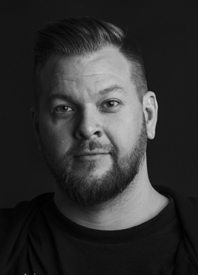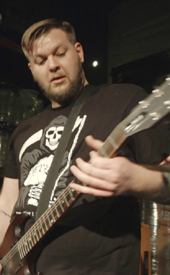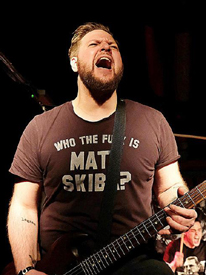|
Interview conducted May 20 2019 Interview published June 21 2019 |
![]()
Norwegian rockers Bokassa are getting a lot of attention this summer after securing a support act slot on Metallica's European tour. On June 21st they also put out their new album Crimson Riders and as the tour is split into 4 legs, vocalist/guitarist Jørn Kaarstad is able to do some promotion over the continent for the album as well.
![]()
Tobbe: Since you're not a household name really yet: Who are Bokassa and what do you guys do?
Jørn: Bokassa is a power trio from Trondheim, Norway. We've been a band since 2013 and has released 1 album and 3 EPs. And soon our second album Crimson Riders is out. We set out to combine riffs from, like, stoner rock and metal with punk and hardcore. And that's pretty much what we do.
 Tobbe:
Bokassa is quite different to name a band after. Please explain what lays
behind the decision to name the band Bokassa.
Tobbe:
Bokassa is quite different to name a band after. Please explain what lays
behind the decision to name the band Bokassa.
Jørn: Well, it was kind of like: we sing about a lot of the atrocities in the world and we felt that Bokassa was a fitting name. In the West you've heard about a lot of dictators, but we tend to forget the other places in the world. That's why we chose Bokassa, because that is an atrocity that happened that not many people know about.
Tobbe: In what way does the new record follow the path set on the first album and even the EPs before that?
Jørn: It's kind of a mix of our first EP War On Everything [2015] and full-length Divide & Conquer [2017], because our first EP was much more melodic than our debut album was and on this record there are a lot more melodic tracks and you can probably hear a natural progress and there's also a bit more experimentation in the songs. It's a very diverse record, so I think there will be something for everyone on this record.
Tobbe: When you make a new album, is it even possible to not compare that new album to what you've done before?
Jørn: Well, I don't know. We see it as two separate things. I write the songs and I write what I write, so it will always sound like my riffs, I guess, and the way I arrange songs. But there are both differences and similarities. You know, they have the same groove and a lot of riffs and stuff like that, but there's also, like, a bigger sound this time. The first one was a more dirty record and this one has a bigger rock sound.
Tobbe: What is your biggest source of inspiration for writing music and writing lyrics?
Jørn: Music: I guess subconsciously you're affected by what you listen to. I can't say I have a big inspiration here and there. Lyrics: It could be everything from an idea to something I've read; a book, or a documentary, or something like that.
 Tobbe:
What bands did you listen to when you were younger that might influence
your work nowadays?
Tobbe:
What bands did you listen to when you were younger that might influence
your work nowadays?
Jørn: Fu Manchu has probably been a big influence on my riffs. The same with Entombed, and also Slayer, and of course Metallica. Also I listened to my favorite band NOFX and I was listening to Bad Religion, Pennywise and Propagandhi and I listened to Dwarves. So you have on one hand the melodic punk/hardcore side and then you have the riffs. So that's probably what influences me still to this day.
Tobbe: Do you have something to say with your lyrics? Like a general meaning or are they just lyrics that pop up in your head?
Jørn: Most of our lyrics are kind of misanthropic. Kind of like the world is fucked. Like nihilistic. But we try to ease up a bit on some tracks. But yeah, most of our lyrics are like "The world has gone to hell." and you just got to write it out.
Tobbe: What do you think is most challenging with making an album in today's musical climate and having a new record out?
Jørn: Getting people to hear it, I think is a big challenge, 'cause there's so many bands, and there's so many good bands, and it's just like a jungle out there. And people have short attention spans. I think on Spotify people listen to the first 10 seconds and stuff. To get people to actually listen I think is the hardest thing.
When we released Divide & Conquer we got really good reviews, but people still didn't listen to it. It was not until, like, a Norwegian rock celebrity called Kristopher Schau said it was the best Norwegian record of the year. Then people listened to it, because he said it.
Tobbe: Some bands have told me that a new record is a new record for, like, one month nowadays, but before a new record was a new record for maybe a year. So will your record be forgotten on July 21st? Probably not since you're out touring, but…
Jørn: Yeah, we will tour this record until the end of 2019, and probably in 2020 as well. But I get what you're saying, because it is like it has become a consumer thing. Before, you had, like, one record and you listened to that all the time, and then you maybe got money for a new record.
So you got, like, a stronger relationship with your record than now when people just stream and click next. We waited two years to release a record, which is a long time in the music industry as it is now. But no, I don't think it will be forgotten.
Tobbe: The record contains less than 30 minutes of music and isn't that kind of short for a full-length record?
Jørn: No, all the records I listened to when I was a kid are 30 minutes, and I like that. I think a record should be maximum 35 minutes. I think all the bands that do 45-50 minutes inevitably always add a filler track, like for example the new Rammstein record [Self-titled, 2019]. There's a lot of great songs, but towards the end it's like "You could have skipped that song.".
So I think around 30-35 is perfect. And if we were, let's say, a classic rock band, we would have 4-5-minute songs, so it's not necessarily the length; it's the number and I think you shouldn't have more than 10 songs on a record, with some exceptions like Guns N' Roses, for example.
Tobbe: How do you personally realize that a good song is a good song?
Jørn: I just kind of feel it. Also I write all the songs on my guitar just sitting in my living room and if my girlfriend is, like, hanging out, and afterwards starts humming it, then I know. And sometimes you just know, like "Oh, that's a good riff!".
 Tobbe:
You've got to put vocals to that riff as well. Is it actually harder to
put a good vocal melody on top of a riff than to actually find the riff
itself?
Tobbe:
You've got to put vocals to that riff as well. Is it actually harder to
put a good vocal melody on top of a riff than to actually find the riff
itself?
Jørn: Yes. 'Cause it's easier to write melodies with power chords. It's harder to write it over a riff. But that's why we do both. Sometimes we sing over the riffs as well. But yeah, it's harder to write a melody over a riff than writing a riff, I think.
Tobbe: You're out with Metallica this summer in Europe. Is it even possible to turn down an offer like that?
Jørn: No. We got the offer last June and I thought it was a prank; couldn't believe it. But I said yes right at the moment when they asked. But yeah, I can't see anyone turning that down.
Tobbe: Do you even get to see those guys? Or do they arrive late when you've already played your show?
Jørn: Lars [Ulrich] comes into our dressing room and hangs out. We have met Rob [Trujillo] and James [Hetfield], because in Paris they invited everyone to, like, a dinner to say thanks for the first leg.
Tobbe: How quickly do you get used to play those bigger stages?
Jørn: I guess: it's a show; the same as a club, 'cause we do off shows in clubs and then we do stadiums during the tour. It's very surreal, but you're still playing your songs and you do what you have to do. So I think around the 4th show we were like "Okay. Now we know exactly what we're gonna do.". But, it's just so massive that, you know, I see some faces down in the snakepit, but there's so many people and you just kind of do your thing. But yeah, it's been really nice.
Related links:
www.facebook.com/bokassaband
![]()